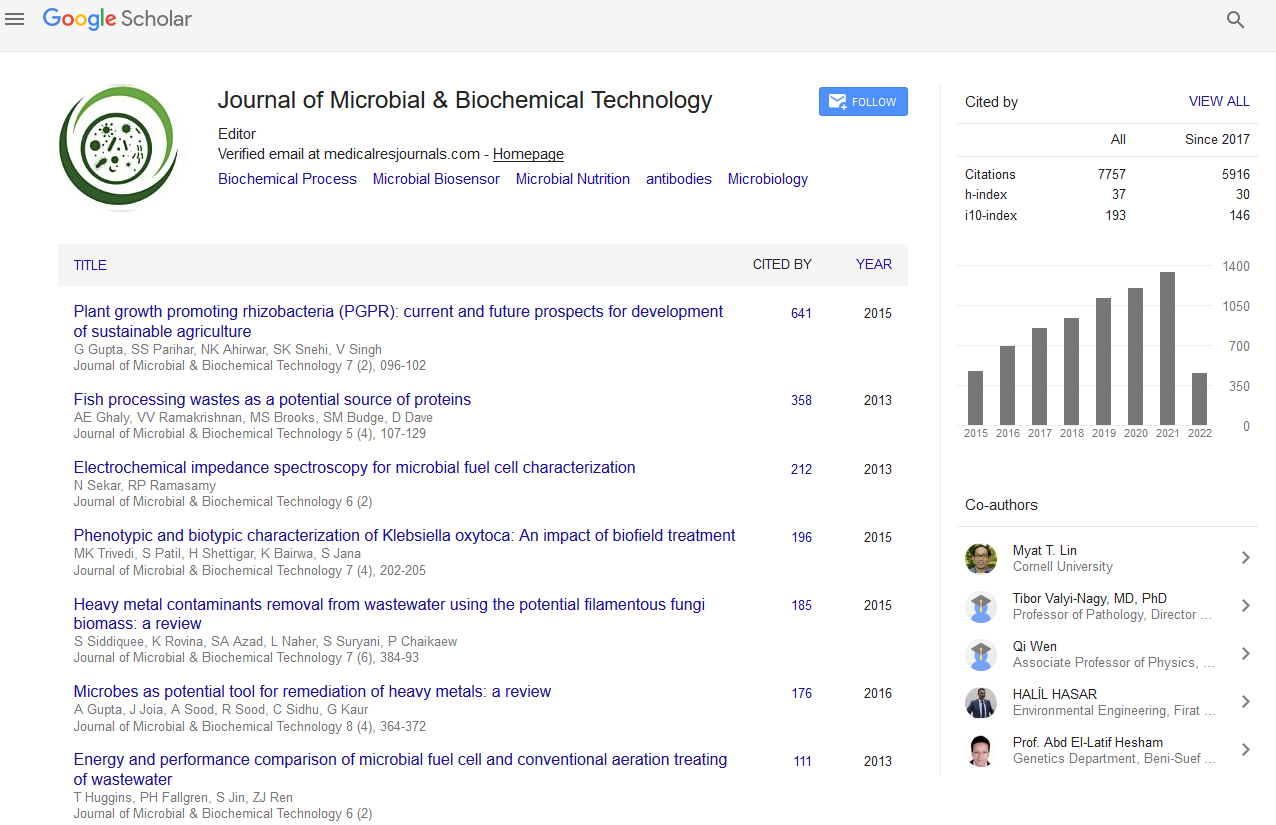PMC/PubMed Indexed Articles
Indexed In
- Academic Journals Database
- Genamics JournalSeek
- Academic Keys
- JournalTOCs
- China National Knowledge Infrastructure (CNKI)
- Scimago
- Access to Global Online Research in Agriculture (AGORA)
- Electronic Journals Library
- RefSeek
- Directory of Research Journal Indexing (DRJI)
- Hamdard University
- EBSCO A-Z
- OCLC- WorldCat
- SWB online catalog
- Virtual Library of Biology (vifabio)
- Publons
- MIAR
- University Grants Commission
- Geneva Foundation for Medical Education and Research
- Euro Pub
- Google Scholar
Useful Links
Share This Page
Journal Flyer

Open Access Journals
- Agri and Aquaculture
- Biochemistry
- Bioinformatics & Systems Biology
- Business & Management
- Chemistry
- Clinical Sciences
- Engineering
- Food & Nutrition
- General Science
- Genetics & Molecular Biology
- Immunology & Microbiology
- Medical Sciences
- Neuroscience & Psychology
- Nursing & Health Care
- Pharmaceutical Sciences
Antimicrobial effect of some plant extracts from antalya region on some pathogen bacteria and fungus
Joint Event on 4th World Congress and Expo on Applied Microbiology & 2nd International Conference on Food Microbiology
November 29-December 01, 2017 Madrid, Spain
Rasih Felek, C Aylin Erman Daloglu, Betil Ozhak Baysan, Gozde Ongut, M Dilara Ogunc and Dilek Colak
Akdeniz University Hospital, Turkey
Akdeniz University, Turkey
Posters & Accepted Abstracts: J Microb Biochem Technol
Abstract:
People have been searching for remedies against various diseases by making herbal teas since ancient times. Nowadays, plants play an important role in food, cosmetic and especially drug industry. Our country has high endemism of species as a result of positioned at the middle of three different phytogeographical regions and ecological differentiation. Approximately 30% of plant species are endemic. Many plant inhibiting substances have been isolated from their roots, leaves and seeds. Increasing resistance to microorganisms, especially in recent years, has increased the trend towards herbal medicines. A lot of studies have shown that many plant extracts and essential oils show antimicrobial activity against bacteria and fungi.The aim of this work is to investigate presence of antimicrobial activities of plants especially from Antalya region which used as a remedy by public. Material and Method: Plants used for research are Salvia virgata, Origanum vulgare subsp. hirtum, Melissa officinalis subsp altissima and Nepeta caesarea. Microorganisms used for research are Echerichia coli, Salmonella typhimurium, Staphylococcus aureus, Enterococcus fecalis, Klebsiella pneumoniae, and Candida albicans. In this research, plants were extracted with ethanol and after solvent was evaporated extracts were sucked on sterile paper discs for further use in disc diffusion method. Results: It�??s been detected that extract of Origanum vulgare and Melissa officinalis have antimicrobial activity on microorganisms in different ratios. Nepeta caesarea hasn�??t any antimicrobial effect against E. coli. Antimicrobial activity was determined against S. typhimurium, S. aureus, E. fecalis, K. pneumoniae, and C. albicans at various ratios. Antimicrobial activity of Salvia virgata was determined at various ratios with other microorganisms except S. typhimurium. Conclusion: It was observed that plant solutions have different effects on various bacteria and fungus.
Biography :
Rasih Felek has completed his MD at Hacettepe University School of Medicine and Postdoctoral studies from Atatürk University School of Medicine. He has published more than 15 papers in reputed journals.


